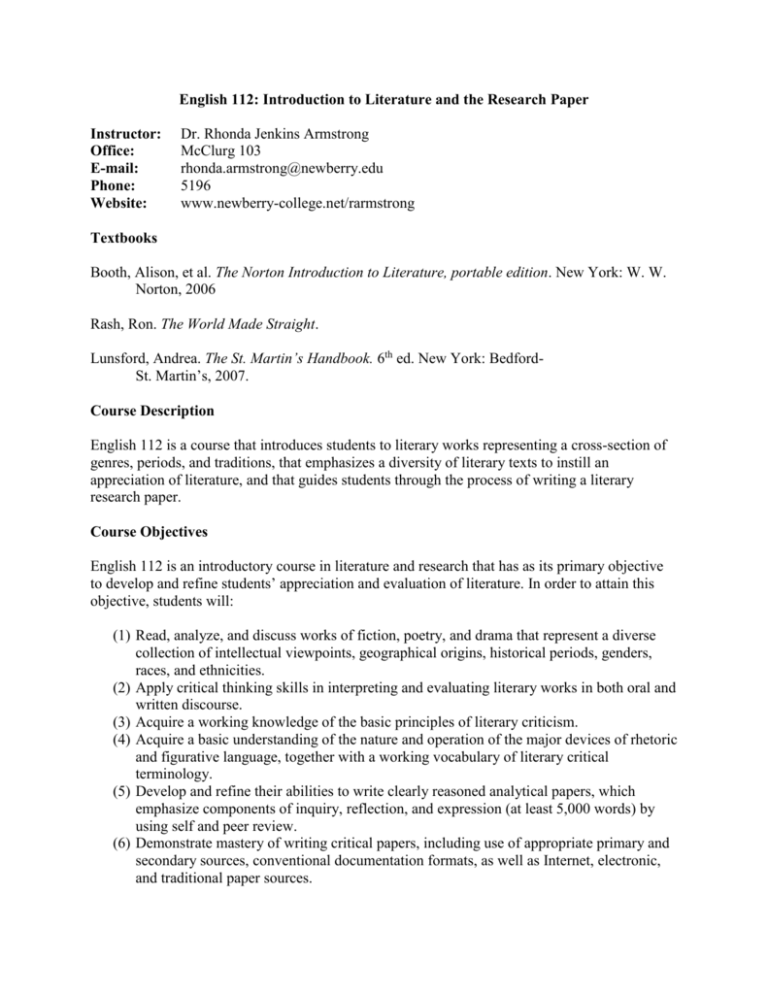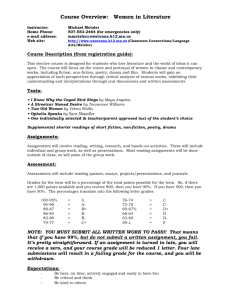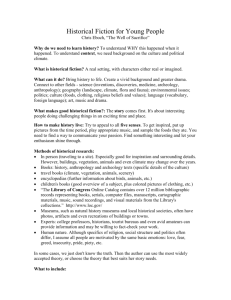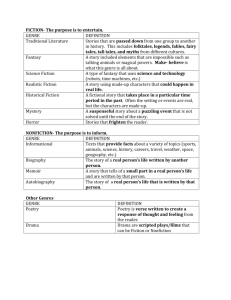as Word document - Newberry
advertisement

English 112: Introduction to Literature and the Research Paper Instructor: Office: E-mail: Phone: Website: Dr. Rhonda Jenkins Armstrong McClurg 103 rhonda.armstrong@newberry.edu 5196 www.newberry-college.net/rarmstrong Textbooks Booth, Alison, et al. The Norton Introduction to Literature, portable edition. New York: W. W. Norton, 2006 Rash, Ron. The World Made Straight. Lunsford, Andrea. The St. Martin’s Handbook. 6th ed. New York: BedfordSt. Martin’s, 2007. Course Description English 112 is a course that introduces students to literary works representing a cross-section of genres, periods, and traditions, that emphasizes a diversity of literary texts to instill an appreciation of literature, and that guides students through the process of writing a literary research paper. Course Objectives English 112 is an introductory course in literature and research that has as its primary objective to develop and refine students’ appreciation and evaluation of literature. In order to attain this objective, students will: (1) Read, analyze, and discuss works of fiction, poetry, and drama that represent a diverse collection of intellectual viewpoints, geographical origins, historical periods, genders, races, and ethnicities. (2) Apply critical thinking skills in interpreting and evaluating literary works in both oral and written discourse. (3) Acquire a working knowledge of the basic principles of literary criticism. (4) Acquire a basic understanding of the nature and operation of the major devices of rhetoric and figurative language, together with a working vocabulary of literary critical terminology. (5) Develop and refine their abilities to write clearly reasoned analytical papers, which emphasize components of inquiry, reflection, and expression (at least 5,000 words) by using self and peer review. (6) Demonstrate mastery of writing critical papers, including use of appropriate primary and secondary sources, conventional documentation formats, as well as Internet, electronic, and traditional paper sources. (7) Demonstrate mastery of the process of writing formal research papers, including analysis, evaluation, and synthesis of research materials. (8) Refine oral communication skills, using various media, including print and non-print material, film, and the Internet and thereby recognizing how the media influence people to think about self and others. (9) Respect the diversity of thought through class discussion. Instructional Methods Independent reading, lectures, discussions (individual, small group, whole class), tests, writing assignments (critical essays and reflective responses), guided research project, oral presentations, writers’ workshops/peer review, individual/group projects, film, electronic media, individual conferences. Attendance This course engages a community of learners, and there can only be community when people are present, both physically and intellectually. Therefore, your attendance and your participation are required. To plan for success in this course, you must abide by the following guidelines: Absences will be noted and will result in a lowering of your participation grade. Excessive absences (more than five) will result in the lowering of your final grade, down to and including an F for the course. There are no excused absences You are expected to conduct yourselves professionally; consequently, disruptions to the learning environment will not be tolerated. o If you interfere with instruction, you will be dismissed from class and will receive both an absence and a zero for that day. o Before class, you must turn off personal electronic equipment, such as cellular telephones and pagers—and keep it off throughout the class. Failure to do so will result in forfeiting this equipment to your professor. In order to be an active participant in your learning, you are expected to be prepared for class. o If you are not prepared to participate, or if you are otherwise engaged during class (e.g., you are sleeping, texting, doing a crossword puzzle, or completing homework for another class), you may be asked to leave and you may be counted absent. o Written assignments are due at the beginning of the class period. Late papers and projects will not be accepted except at the discretion of your professor Evaluation Reading and daily assignments: You are expected to demonstrate careful reading of all assigned text through active participation in class discussions and successful performance on regular, unannounced in-class quizzes. You may also be required to complete occasional written daily assignments, which will be announced in class. Written work: You are required to write three short (3-4 page) essays, one for each section of the course. Additionally, you are required to write a lengthy (8-10 page) research paper on a topic related to our study of literature. Detailed assignment guidelines and suggestions for topic selection will be provided for each assignment. All work written outside of class is to be typed unless otherwise noted. Exams: You are expected to demonstrate knowledge and understanding of literary terms and concepts on midterm and final examinations consisting of short answer, identification, multiple choice and/or matching questions. Participation: You are expected to attend class prepared to participate in formal and informal discussion and inclass writings and assignments. Grading Short Essays: #1 #2 #3 = 10% = 10% = 10% Daily assignments = 20% Midterm exam Final exam = 10% = 15% Research Project = 25% (Preliminary Bibliography 5%; Research Summaries 5%; Final Paper 15%) Grading standards are available online and will be discussed in detail before the first assignment. Specific standards for each assignment are detailed on each assignment sheet, also available online. Please print them out and read them carefully. English Department numerical equivalents for computation of final grades: A B+ B C+ C D+ D F = 93-100 = 90-92 = 85-89 = 80-84 = 75-79 = 70-74 = 65-69 = 0-64 Office Conferences Plan to have at least two conferences with me this semester to discuss your written work (at any stage of the process) and your progress in the course. Try to have the first conference early in the course; don’t delay. Also consider taking your ideas and your written work to the Writing Center in Wright Hall, where trained peer tutors will consult with writers about any piece of writing at any stage of the writing process. For more information, call the Writing Center at 321-5216. You are also welcome to meet with me even if you are not experiencing problems in this class! Please, never hesitate to stop by office hours or to make an appointment with me. Academic Honesty Newberry College and your professor deal severely with cheating and plagiarism. Students who cheat on assignments or tests, who knowingly use another’s ideas or words without proper documentation, or who submit another’s work will receive the maximum penalty: failure of the course and a report to the Dean for Student Affairs. See the Student Handbook for details on college policies on cheating, plagiarism, and academic honesty. Complete information on this policy can be found in your Student Handbook, available online at http://www.newberry.edu/documents/documents/50.pdf We will spend considerable class time on issues related to plagiarism and citation in particular. Communication Across the Curriculum Program Students complete Level 1 of CACP requirements by passing English 111 with a “C” or better. Once students have met the Level 1 requirement, they may begin submitting Level 2 papers. For details, see the CACP manual at http://www.newberry.edu/academics/cacpprogram.asp Students with Special Needs If you are a student with a documented learning disability who requires special accommodations, it is your responsibility to contact the office of Disabilities Support Services (located in Holland Hall, suite 200, ext 5110) to make such arrangements. Following a confidential interview, the Director of Disabilities Support Services will contact your instructors to inform them of your special needs. Note: your instructors are not permitted to discuss your disabilities with you until you have registered with the office of Disabilities Support Services. For further information, please visit the following website: http://www.newberry-college.net/dss This syllabus is a contract between the professor and students. If you choose to remain in the class, you agree to know and abide by the policies stated herein. Course Schedule This schedule, like all pieces of writing, is subject to judicious revision. Any changes will be announced in class well ahead of time. All readings are from the Norton Introduction to Literature unless otherwise specified. Date Class Topic W 1/9 Introduction to the course and one another Introduction to critical reading Introduction to Fiction: the Short Story F M 1/11 1/14 W 1/16 Fiction: Plot F M W 1/18 1/21 1/23 Fiction: Plot MLK Day – no class meeting Fiction: Point of view F 1/25 Fiction: Point of view M 1/28 Fiction: Character W 1/30 Writing about Literature F 2/1 Fiction: Setting M W 2/4 2/6 African American Read-In Fiction: Symbol F 2/8 Fiction: Theme M W F M 2/11 2/13 2/15 2/18 Fiction: The text as a whole Introduction to the Research Essay Introduction to Library Research Critical approaches to reading W F 2/20 2/22 Critical approaches to reading Critical approaches to reading Reading Due Writing Due “Introduction” (1-10) “Fiction: Reading, Writing, Responding” (12-15); Carver, “Cathedral” (21-32) “Plot” (57-62); Faulkner, “A Rose for Emily” (356-363) Baldwin, “Sonny’s Blues” (81-105) “Point of View” (106-108); Hemingway, “Hills Like White Elephants” (114-118) Chopin, “Story of an Hour” (314315) “Character” (119-123); Welty, “Why I Live at the P.O.” (123-132) “Writing about Literature” (11161119); Summary and Description of “Why I Live at the P. O.” (2 pages) “Setting” (165-166); Chekhov, “The Lady with the Dog” (181-194) “Symbol” (195-197) Hawthorne, “Young Goodman Brown” (197-207) “Theme” (215-216); Gilman, “The Yellow Wallpaper” (316-327) Erdrich, “Love Medicine” (269-285) “The Research Essay” (1144-1160) Essay 1 Due “Critical Approaches” (1187-1196); Brooks, “First Fight. Then Fiddle” (548) “Critical Approaches” (1196-1204) Project Proposal Due; “Critical M W F 2/25 2/27 2/29 Approaches” (1204-1215) Using sources in research and writing Bring copies of one secondary source Midterm Citation workshop Preliminary Bibliography Due M W F 3/3 3/5 3/7 Fiction: the Novel Fiction: Novel Fiction: Novel M W 3/10 3/12 Fiction: Novel Introduction to Poetry F M W 3/14 3/17 3/19 3/21 – 3/28 Poetry: Structure Poetry: Form Poetry: Tone Easter/Spring Break – no class meetings M W 3/31 4/2 Poetry: Language Introduction to Drama F M W F 4/4 4/7 4/9 4/11 Drama Drama Drama Drama M W F M W TBA 4/14 4/16 4/18 4/21 4/23 TBA Drama Drama Draft workshop Draft workshop Course wrap-up and tearful farewells Final Exam Rash, The World Made Straight Rash, The World Made Straight Rash, The World Made Straight Rash, The World Made Straight “Poetry: Reading, Responding, Writing” (398-410) “Internal Structure” (520-531) “External Form” (540-554) “Tone” (416-426) “Language” (465-477; 481-485) Essay 2 due; “Elements of Drama” 667-675) Wilson, The Piano Lesson (716-778) Wilson, The Piano Lesson (716-778) Wilson, The Piano Lesson (716-778) Essay 3 due; Ibsen, A Doll House (993-1045) Ibsen, A Doll House (993-1045) Ibsen, A Doll House (993-1045) Full draft of research paper Revised draft of research paper Research projects due







